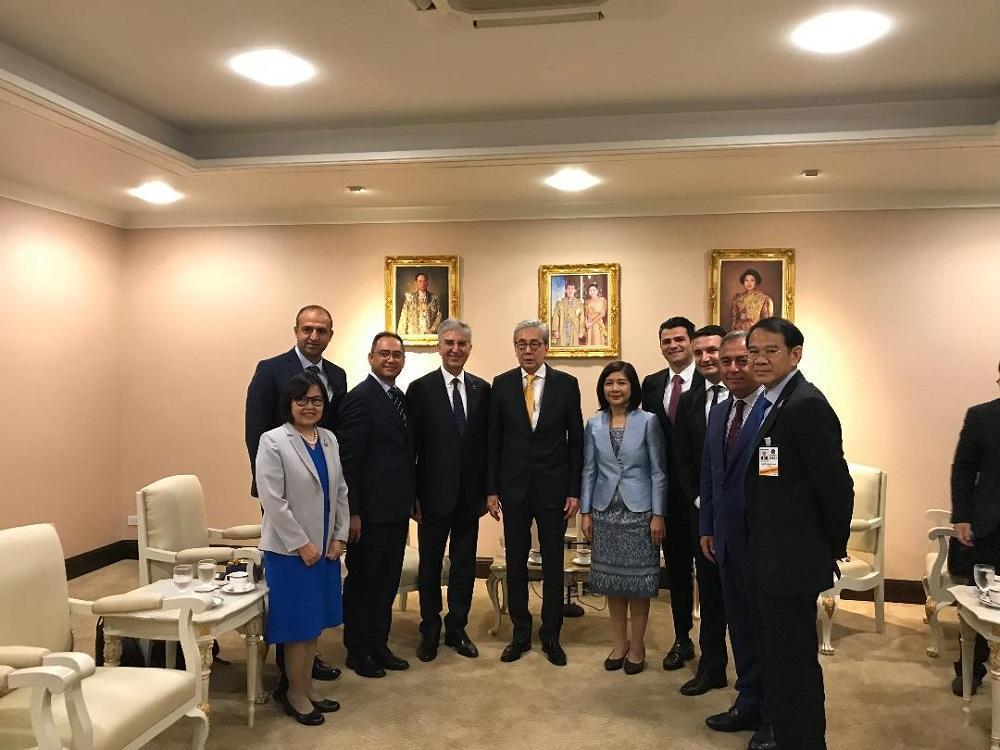
A group of Turkish businesspeople from various sectors have visited senior Thai government officials in Bangkok to learn more about investment opportunities in the country and seek mutual partnerships with Thai companies.
The meetings, organized by the Thai Embassy of Turkey, also hosted a group of Turkish media members from Istanbul and Ankara.
During the meetings that took place between Sept. 4 – 9, Thai officials emphasized that the country was Southeast Asia’s logistics hub and therefore an ideal candidate if Turkish businesspeople wanted to penetrate into the region.
“If you [Turkey] want to have a foot in this region, we [Thailand] can be important for you,” said Thai ambassador to Turkey Phantipha Iamsudha Ekarohit during the Turkish delegation’s meeting with Thai Industry Ministry officials.
During a meeting held at the Government House, which refers to the offices of the prime minister of Thailand and cabinet ministers, Deputy Prime Minister Somkid Jatusripitak told the Turkish delegation that Thailand welcomes investments from all countries on the basis of “first come, first served.”
“If you are based in Thailand, it means that you have also invested in the Asia market. We are a hub; that is why we invest so much in infrastructure – to improve connectivity [with neighboring countries],” said Jatusripitak.
There are already three big Turkish companies operating factories in Thailand: White goods maker Arçelik, the owner of the Beko brand; HİDROMEK, a leading manufacturer of construction machinery; and Kordsa, a global player of tire, construction reinforcement and composite technologies.
But both Turkish businesspeople and Thai officials expressed their wishes during the meetings that this number would increase further in the future as the share of Turkish investment in total foreign direct investment in Thailand for the period of January-June of this year stands at mere 0.05 percent, while it was zero in 2018, according to data provided by the Board of Investment of Thailand.
Pınar Koyuncu, business development and sales coordination manager for the Asia Pacific region of Beko, told daily Hürriyet on the sidelines of a meeting, “Now is the time to invest in Thailand.” Thailand’s logistics importance in the region, its skilled labor, vibrant domestic consumer market and booming economy make it a luring investment choice, she said.
Trade volume expected to increase by 40 percent
Turkey announced in August that it launched the “Asia Anew” initiative to increase its ties with Asia. The initiative seeks cooperation on education, defense industry, investments, trade, technology, culture and political dialogue.
But talks on boosting trade between Turkey and Thailand have already been on the table since July 2017 – when a declaration to start negotiations for a free trade agreement was signed. The fifth round of negotiations took place between April 10-12 of this year, with officials then saying that the talks had yielded solid progress.
Turkey’s ambassador to Thailand Evren Dağdelen Akgün said in an interview with Turkish media representatives in Bangkok that once the free trade agreement is finalized, the bilateral trade volume is projected to increase by 40 percent.
“Turkey and Thailand are very similar. We are both value-based societies with warm-hearted people. But due to physical distance, we do not know each other. But technology reduces the distance between the two countries,” she said.
“As part of ‘Asia Anew,’ Thailand will be one of the prominent countries that Turkey will focus on. And trade will be the anchor of that,” the Turkish ambassador said.
Akgün’s Thai counterpart Ekarohit said that the current level of trade volume between the two countries – which stands at $1.4 billion according to official Thai figures and $2 billion according to official Turkish figures – is “disappointing.” “We do not know each other well, that is why,” Ekarohit said, referring to the governments and private sectors.